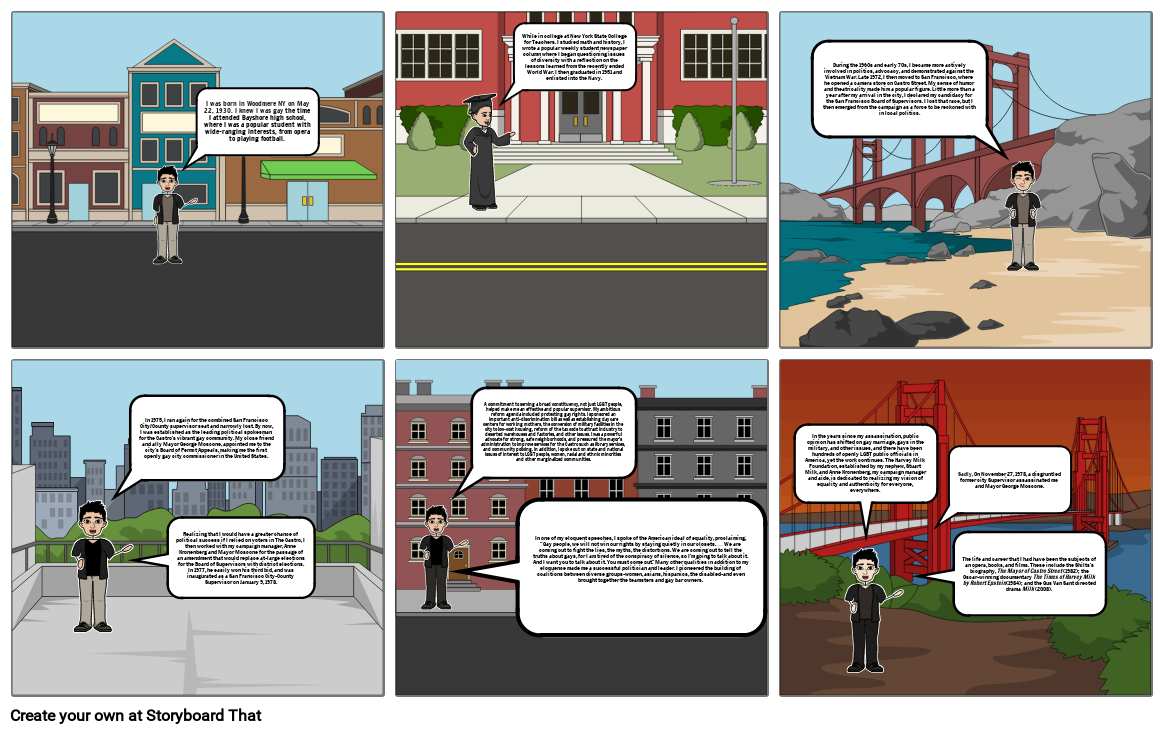Harvey Milk

Storyboard Text
- I was born in Woodmere NY on May 22, 1930. I knew I was gay the time I attended Bayshore high school, where I was a popular student with wide-ranging interests, from opera to playing football.
- While in college at New York State College for Teachers. I studied math and history, I wrote a popular weekly student newspaper column where I began questioning issues of diversity with a reflection on the lessons learned from the recently ended World War. I then graduated in 1951 and enlisted into the Navy.
- During the 1960s and early 70s, I became more actively involved in politics, advocacy, and demonstrated against the Vietnam War. Late 1972, I then moved to San Francisco, where he opened a camera store on Castro Street. My sense of humor and theatricality made him a popular figure. Little more than a year after my arrival in the city, I declared my candidacy for the San Francisco Board of Supervisors. I lost that race, but I then emerged from the campaign as a force to be reckoned with in local politics.
- In 1975, I ran again for the combined San Francisco City/County supervisor seat and narrowly lost. By now, I was established as the leading political spokesman for the Castro’s vibrant gay community. My close friend and ally Mayor George Moscone, appointed me to the city’s Board of Permit Appeals, making me the first openly gay city commissioner in the United States.
- Realizing that I would have a greater chance of political success if I relied on voters in The Castro, I then worked with my campaign manager, Anne Kronenberg and Mayor Moscone for the passage of an amendment that would replace at-large elections for the Board of Supervisors with district elections. In 1977, he easily won his third bid, and was inaugurated as a San Francisco City-County Supervisor on January 9, 1978.
- In one of my eloquent speeches, I spoke of the American ideal of equality, proclaiming, “Gay people, we will not win our rights by staying quietly in our closets. … We are coming out to fight the lies, the myths, the distortions. We are coming out to tell the truths about gays, for I am tired of the conspiracy of silence, so I’m going to talk about it. And I want you to talk about it. You must come out.” Many other qualities in addition to my eloquence made me a successful politician and leader. I pioneered the building of coalitions between diverse groups-women, asians, hispanics, the disabled-and even brought together the teamsters and gay bar owners.
- A commitment to serving a broad constituency, not just LGBT people, helped make me an effective and popular supervisor. My ambitious reform agenda included protecting gay rights. I sponsored an important anti-discrimination bill as well as establishing day care centers for working mothers, the conversion of military facilities in the city to low-cost housing, reform of the tax code to attract industry to deserted warehouses and factories, and other issues. I was a powerful advocate for strong, safe neighborhoods, and pressured the mayor’s administration to improve services for the Castro such as library services, and community policing. In addition, I spoke out on state and national issues of interest to LGBT people, women, racial and ethnic minorities and other marginalized communities.
- In the years since my assassination, public opinion has shifted on gay marriage, gays in the military, and other issues, and there have been hundreds of openly LGBT public officials in America, yet the work continues. The Harvey Milk Foundation, established by my nephew, Stuart Milk, and Anne Kronenberg, my campaign manager and aide, is dedicated to realizing my vision of equality and authenticity for everyone, everywhere.
- The life and career that I had have been the subjects of an opera, books, and films. These include the Shilts’s biography, The Mayor of Castro Street (1982); the Oscar-winning documentary The Times of Harvey Milk by Robert Epstein(1984); and the Gus Van Sant directed drama Milk (2008).
- Sadly, On November 27, 1978, a disgruntled former city Supervisor assassinated me and Mayor George Moscone.
Over 30 Million Storyboards Created
No Downloads, No Credit Card, and No Login Needed to Try!


